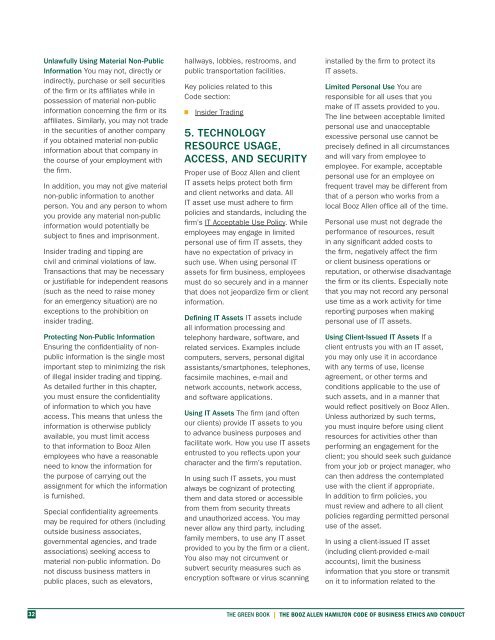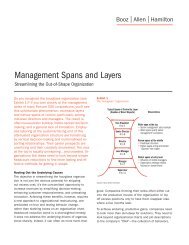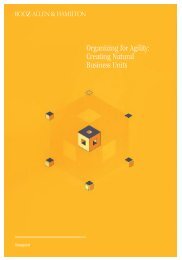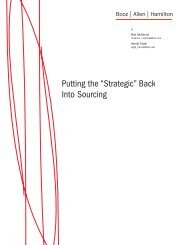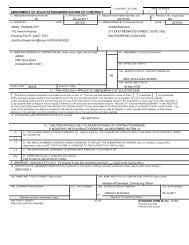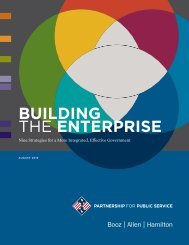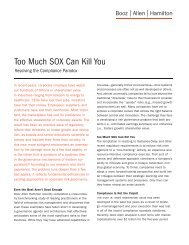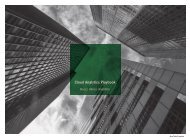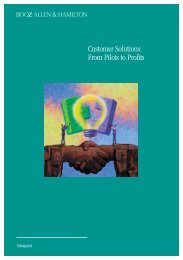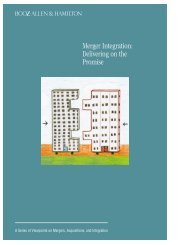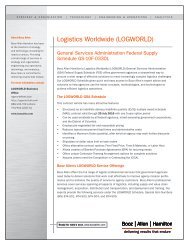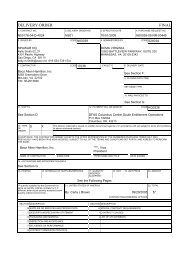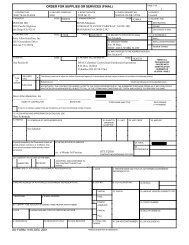Green Book - Booz Allen Hamilton
Green Book - Booz Allen Hamilton
Green Book - Booz Allen Hamilton
- No tags were found...
Create successful ePaper yourself
Turn your PDF publications into a flip-book with our unique Google optimized e-Paper software.
Unlawfully Using Material Non-Public<br />
Information You may not, directly or<br />
indirectly, purchase or sell securities<br />
of the firm or its affiliates while in<br />
possession of material non-public<br />
information concerning the firm or its<br />
affiliates. Similarly, you may not trade<br />
in the securities of another company<br />
if you obtained material non-public<br />
information about that company in<br />
the course of your employment with<br />
the firm.<br />
In addition, you may not give material<br />
non-public information to another<br />
person. You and any person to whom<br />
you provide any material non-public<br />
information would potentially be<br />
subject to fines and imprisonment.<br />
Insider trading and tipping are<br />
civil and criminal violations of law.<br />
Transactions that may be necessary<br />
or justifiable for independent reasons<br />
(such as the need to raise money<br />
for an emergency situation) are no<br />
exceptions to the prohibition on<br />
insider trading.<br />
Protecting Non-Public Information<br />
Ensuring the confidentiality of nonpublic<br />
information is the single most<br />
important step to minimizing the risk<br />
of illegal insider trading and tipping.<br />
As detailed further in this chapter,<br />
you must ensure the confidentiality<br />
of information to which you have<br />
access. This means that unless the<br />
information is otherwise publicly<br />
available, you must limit access<br />
to that information to <strong>Booz</strong> <strong>Allen</strong><br />
employees who have a reasonable<br />
need to know the information for<br />
the purpose of carrying out the<br />
assignment for which the information<br />
is furnished.<br />
Special confidentiality agreements<br />
may be required for others (including<br />
outside business associates,<br />
governmental agencies, and trade<br />
associations) seeking access to<br />
material non-public information. Do<br />
not discuss business matters in<br />
public places, such as elevators,<br />
hallways, lobbies, restrooms, and<br />
public transportation facilities.<br />
Key policies related to this<br />
Code section:<br />
oo<br />
Insider Trading<br />
5. Technology<br />
Resource Usage,<br />
Access, and Security<br />
Proper use of <strong>Booz</strong> <strong>Allen</strong> and client<br />
IT assets helps protect both firm<br />
and client networks and data. All<br />
IT asset use must adhere to firm<br />
policies and standards, including the<br />
firm’s IT Acceptable Use Policy. While<br />
employees may engage in limited<br />
personal use of firm IT assets, they<br />
have no expectation of privacy in<br />
such use. When using personal IT<br />
assets for firm business, employees<br />
must do so securely and in a manner<br />
that does not jeopardize firm or client<br />
information.<br />
Defining IT Assets IT assets include<br />
all information processing and<br />
telephony hardware, software, and<br />
related services. Examples include<br />
computers, servers, personal digital<br />
assistants/smartphones, telephones,<br />
facsimile machines, e-mail and<br />
network accounts, network access,<br />
and software applications.<br />
Using IT Assets The firm (and often<br />
our clients) provide IT assets to you<br />
to advance business purposes and<br />
facilitate work. How you use IT assets<br />
entrusted to you reflects upon your<br />
character and the firm’s reputation.<br />
In using such IT assets, you must<br />
always be cognizant of protecting<br />
them and data stored or accessible<br />
from them from security threats<br />
and unauthorized access. You may<br />
never allow any third party, including<br />
family members, to use any IT asset<br />
provided to you by the firm or a client.<br />
You also may not circumvent or<br />
subvert security measures such as<br />
encryption software or virus scanning<br />
installed by the firm to protect its<br />
IT assets.<br />
Limited Personal Use You are<br />
responsible for all uses that you<br />
make of IT assets provided to you.<br />
The line between acceptable limited<br />
personal use and unacceptable<br />
excessive personal use cannot be<br />
precisely defined in all circumstances<br />
and will vary from employee to<br />
employee. For example, acceptable<br />
personal use for an employee on<br />
frequent travel may be different from<br />
that of a person who works from a<br />
local <strong>Booz</strong> <strong>Allen</strong> office all of the time.<br />
Personal use must not degrade the<br />
performance of resources, result<br />
in any significant added costs to<br />
the firm, negatively affect the firm<br />
or client business operations or<br />
reputation, or otherwise disadvantage<br />
the firm or its clients. Especially note<br />
that you may not record any personal<br />
use time as a work activity for time<br />
reporting purposes when making<br />
personal use of IT assets.<br />
Using Client-Issued IT Assets If a<br />
client entrusts you with an IT asset,<br />
you may only use it in accordance<br />
with any terms of use, license<br />
agreement, or other terms and<br />
conditions applicable to the use of<br />
such assets, and in a manner that<br />
would reflect positively on <strong>Booz</strong> <strong>Allen</strong>.<br />
Unless authorized by such terms,<br />
you must inquire before using client<br />
resources for activities other than<br />
performing an engagement for the<br />
client; you should seek such guidance<br />
from your job or project manager, who<br />
can then address the contemplated<br />
use with the client if appropriate.<br />
In addition to firm policies, you<br />
must review and adhere to all client<br />
policies regarding permitted personal<br />
use of the asset.<br />
In using a client-issued IT asset<br />
(including client-provided e-mail<br />
accounts), limit the business<br />
information that you store or transmit<br />
on it to information related to the<br />
32<br />
THE GREEN BOOK | The <strong>Booz</strong> <strong>Allen</strong> <strong>Hamilton</strong> Code of Business Ethics and Conduct


